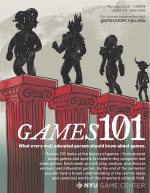The Unfortunate Game Events Seminar
-A Seminar on Failures, Tragedies, and other Unpleasant Aspects of Games
I have the pleasure of inviting you to the Unfortunate Game Events seminar on May 19th, 2011 at the Danish Design School in Copenhagen.
The Unfortunate Game Events seminar explores the dark side of games: It is clear that games are not simply “fun”, but what does it mean when games are decidedly unpleasant? How and why do we deal with failure in video games? Does the structure of game necessitate straightforward heroics, or can games contain tragic content? Have the introduction of usability methods into game design and the expansion of the game audience led to games becoming too easy? How can these lessons from games be applied to other types of design?
The seminar is free, but space is limited, so reserve a seat by emailing seminar@jesperjuul.net. Hope to see you there!

The seminar is sponsored by the Danish Centre for Design Research.
Up-to-date program and directions are available at http://www.jesperjuul.net/ludologist/unfortunate-game-events
Preliminary Program
12:30 Coffee, registration
13:00 Welcome by Jesper Juul
13:15 Miguel Sicart & Douglas Wilson: Aesthetics of Abusive Game Design, From Kaizo Mario to Marina Abramović
13:55 Sara Mosberg Iversen: Failure in a broad challenge perspective
14:25 Jesper Juul: Video Games, the Art of Failure
14:55 Break
15:10 Lisbeth Klastrup: Death in Games and Social Stories
15:40 Jaakko Steenros: Tragedy and Live Action Role-playing Games
16:10 Aki Järvinen: Social Disasters: The Role of Failure in Social Games
16:40-17:00: Final discussion
Seminar Directions
Seminar location: Auditorium 5, Philip de Langes Allé 10, DK-1435 Copenhagen C, Denmark.
Directions at http://dkds.dk/skolen/find_vej
Speaker bios
Sara Mosberg Iversen is an Associate Professor at the Department of Literature, Culture and Media at the University of Southern Denmark in Odense. Her research interest is new media with a particular focus on digital games. Currently she is investigating how players of The Sims 3 construct, modify and play with place. Her earlier work focused more on digital games and the ways particular designs may facilitate and motivate different types of experiences.
Aki Järvinen is Creative Director at Digital Chocolate’s Helsinki studio. His PhD on emotions and video games, Games Without Frontiers was completed at University of Tampere in 2008. He blogs regularly on Games for Social Networks.
Lisbeth Klastrup is an Associate Professor at the IT University of Copenhagen, where she is affiliated with the Digital Culture and Mobile Communication Research Group. She researches internet communication and culture, gameworlds and mobile communication, in particular social media formats. Currently, she is focusing on forms of personal storytelling (such as blogs or status updates) and user-generated content.
Jesper Juul is a video game theorist currently at The Danish Design School and New York University Game Center. He has previously worked at the Singapore-MIT GAMBIT Lab at MIT and at the IT University of Copenhagen. His books Half-Real and A Casual Revolution were published by MIT Press in 2005 and 2009. He maintains the blog The Ludologist on “game research and other important things”.
Miguel Sicart is Associate Professor at the IT University of Copenhagen, where he teaches game design. He received his Ph.D. in game studies 2006; taking a multidisciplinary approach to ethics and computer games, he studied issues of game design, violence and videogames and the role of age-regulation codes. His book The Ethics of Computer Games, based on his doctoral work, came out on MIT Press in 2009. He is currently working on developing a design framework for implementing ethical gameplay in digital games.
Jaakko Stenros (M.Soc.Sc.) works as a game researcher and a doctoral candidate at Game Research Lab (University of Tampere). He is an author of Pervasive Games: Theory and Design (2009), as well as an editor of three books on role-playing games, Nordic Larp (2010), Playground Worlds (2008) and Beyond Role and Play (2004). He lives in Helsinki, Finland.
Douglas Wilson is a PhD candidate at IT University of Copenhagen’s Center for Computer Games Research, where he teaches and researches game design. He is also a co-founder of the Copenhagen Game Collective, a multi-gender, multi-national game design collective based in Copenhagen, Denmark.

![trader_600[1]](http://www.jesperjuul.net/ludologist/wp-content/uploads/2011/05/trader_6001-450x104.jpg)
![noquarter_small[1]](http://www.jesperjuul.net/ludologist/wp-content/uploads/2011/05/noquarter_small1-450x597.jpg)


![achievements-2[1] Game completion rate](http://www.jesperjuul.net/ludologist/wp-content/uploads/2011/04/achievements-21-450x337.png)